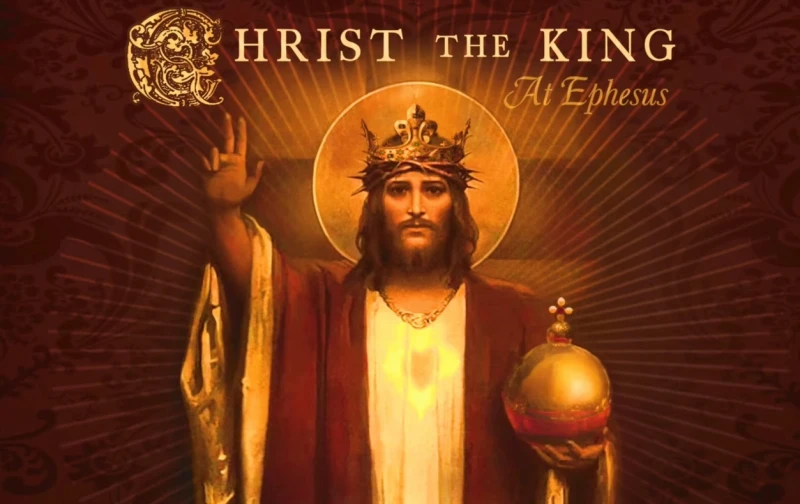
null / Credit: Courtesy of the Benedictines of Mary, Queen of Apostles
Dublin, Ireland, Nov 22, 2025 / 13:00 pm (CNA).
Marthe de Noaillat, called the “Apostle of Christ the King” by her biographer, had a singular mission in life that she believed had been entrusted to her: to promote the universal kingship of Jesus Christ.
“Marthe was the woman who single-handedly brought this to the Church. This is not unusual, indeed the hard lifting in many of these causes was done by women of profound faith,” Father Bernard McGuckian, SJ, host of a new EWTN Ireland television series, told CNA.
De Noaillat was the seventh child in a family of 12 whose parents, Jean-Baptiste Devuns and Anne Zélina, were pious Catholics.
After spending seven years discerning a cloistered vocation, de Noaillat was led instead into the heart of the world as a missionary. With the encouragement and approval of Popes Benedict XV and Pius XI, she organized a global referendum aimed at gathering the faithful to acknowledge the “sovereign rights” of Christ, meaning that Christ is king over everything, including the entire universe.

Her efforts, carried out over six demanding years, helped pave the way for the Church’s solemn proclamation of Christ’s kingship and the establishment of the feast of Christ the King, which was formally instituted by Pope Pius XI in his encyclical Quas Primas in December 1925.
A life devoted to the kingship of Christ
Jean-Claude Prieto de Acha, author of a 2025 biography of de Noaillat, told CNA: “No trace of the kingship of Christ is found in Marthe’s early writings. On the other hand, St. Joan of Arc was greatly venerated in her family home. The mention of this kingship is very present in the life of St. Joan of Arc, from the exhortation of the archangel St. Michael: ‘Go, daughter of God! The King of Heaven will help you.’”
From Joan’s meeting with the Dauphin in Chinon she reportedly said: “I come from the King of Heaven to lift the siege of Orléans,” and “Gentle Dauphin, my name is Joan the Maid, and the King of Heaven informs you through me that you will be consecrated and crowned in the city of Reims.” And when she reached Orléans, she said: “I bring you the help of the King of Heaven.”

De Noaillat wanted to be a nun and entered the convent where, despite numerous health problems, she was determined to take vows. Eventually, however, her poor health became too much, and she left the convent at her mother superior’s instructions.
“Each of her stays at the convent resulted in considerable physical weakness, forcing her to return regularly to her family home to regain her health,” de Acha told CNA.
“Her desire for religious life constantly drew her back to the cloister, but with each new attempt at religious life, her health deteriorated further, and she found herself in such a state of physical decline that when she finally had to renounce this cloistered life, it took her months to stand again. But she remained faithful throughout her life — even after her marriage — to her religious vows. Her husband, Georges de Noaillat, attested to this in writing after his wife’s death.”
Georges also relayed that one of his wife’s superiors in the convent said: “Marthe is not made to live within four walls; it is in the public squares that she must preach… She had only one thought: to win souls for Jesus Christ.”
De Acha pointed out that it is likely that de Noaillat’s natural eloquence was noticed at the convent “not during the daily routine of community life, during which silence was imposed, but when she was asked to speak before the sisters.”

Marthe and Georges’ relationship was reportedly a happy one — two zealous servants of Christ in a Josephine marriage, living as brother and sister, with the blessing of their bishop. After their marriage, each continued their work. In 1918, Marthe took up the role of director of the Hieron Museum in Paray-Le-Monial. There she redoubled her efforts in support of the kingship of Christ.
De Acha told CNA: “It is certain that she knew — and perhaps felt more keenly than others — her utter powerlessness to carry out the tasks entrusted to her without the help, support, and inner strength drawn from Eucharistic adoration and daily Communion. Marthe never relied on her own strength; the experience of her profound physical weakness during her attempts at religious life certainly marked her forever.”
The Italian Jesuit Father Jean-Maria Sanna-Solaro in 1870 initiated a request to institute the feast of Christ the King. The Congregation of Rites in the Vatican rejected that request.
Explaining de Noaillat’s subsequent initial petition to the pope to establish a feast of Christ the King, de Acha explained: “This initial petition to Rome was merely a personal initiative by Marthe, even though it had been forwarded and thus approved by Bishop Berthoin of Autun. Benedict XV’s response — a request that would be echoed by his successor, Pius XI — was therefore legitimate: to establish this feast, the request had to be universal and therefore bear the signatures of bishops from around the world. The head of the Church will only accept the petition on the day it is signed by a majority of the episcopate.”
Finally convinced of the support from the faithful, Pope Pius XI let de Noaillat know of his intention to establish the feast in a Mass on the last day of the holy year of 1925, to which she and her husband were invited as guests of honor. The feast of Christ the King is now celebrated on the last Sunday before Advent.

De Noaillat’s unexpected death
Marthe de Noaillat died unexpectedly and suddenly along with her secretary on Feb. 5, 1926, not long after the feast of Christ the King was inaugurated.
“Marthe had her breakfast as usual with the parish priest after Mass in Paray Le Monial — the church where the Sacred Heart appeared to St. Margaret Mary Alacoque — and went back to her office to work,” McGuckian explained. “When she failed to return later for lunch as agreed, she was found dead in her office along with her secretary, Jeanne Lépine; both had succumbed to accidental carbon monoxide poisoning.”
He added: “It was a tragic and unexpected end to the life of such a remarkable woman. It is hoped now that with the anniversary of the inauguration of the feast day, and 100 years since the publication of Quas Primas, that Marthe will receive the recognition that she never sought for herself but which is fully deserved for her devoted and tenacious advocacy for the kingship of Christ.”
Georges de Noaillat, 10 years later, was ordained to the priesthood and died in January 1948.















